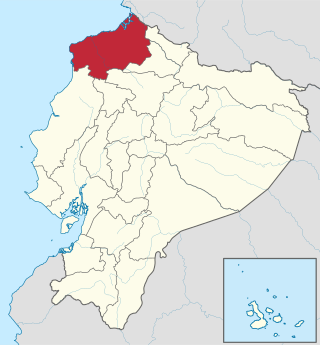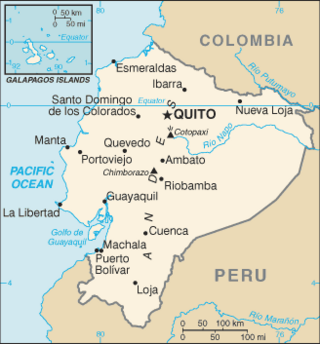
Esmeraldas is a province in northwestern Ecuador. The capital is Esmeraldas.

Esmeraldas is a coastal city in northwestern Ecuador. It is the seat of the Esmeraldas Canton and capital of the Esmeraldas Province. It has an international sea port and a small airport. Esmeraldas is the major seaport of northwestern Ecuador, and it lies on the Pacific coast at the mouth of the Esmeraldas River. It is the antipodes of Padang, Indonesia. The city is the principal trading hub for the region's agricultural and lumber resources, and is the terminus of the 313-mile (504-km) Trans-Ecuadorian Pipeline from the oil fields in northeastern Ecuador.

Carlos Julio Arosemena Tola was President of Ecuador 16 September 1947 to 1 September 1948. He was also the father of future president Carlos Julio Arosemena Monroy.

Admiral Ramón Castro Jijón was President of Ecuador 11 July 1963 to 29 March 1966. He was appointed commander of the Ecuadorian Navy by Carlos Julio Arosemena Monroy, whom he later overthrew in a coup. For his entire term as President he was chairman of a military junta.
Otto Arosemena Gómez was President of Ecuador from 16 November 1966 to 1 September 1968.

Carlos Julio Arosemena Monroy was an Ecuadorian politician. Arosemena Monroy was elected as Vice President of Ecuador in 1960 and due to the ousting of President José María Velasco Ibarra, became President of Ecuador from 7 November 1961 to 11 July 1963.
Muisne is a coastal town in the southwest of the province of Esmeraldas in northwestern Ecuador, with a population of 5,574 in the last Ecuadorian census in 2022. It is the seat of the namesake canton.

The history of the Republic of Ecuador from 1960 to 1990 encompasses a period of political, social, and economic changes in the country. During this time, Ecuador experienced military regimes, political instability, social movements, and economic challenges.
Carlos Julio Arosemena Tola is a location in the Napo Province, Ecuador. It is the seat of the Carlos Julio Arosemena Tola Canton.

Tulcán Canton is a canton of Ecuador, located in Carchi Province. Its capital is the city of Tulcán. The population of the canton in the 2001 census was 77,175 and 86,498 in the 2010 census. The area of the canton is 1,812 square kilometres (700 sq mi).

Palanda Canton is a canton of Ecuador, located in the Zamora-Chinchipe Province. Its capital is the town of Palanda. Its population at the 2001 census was 7,066.
Tola is a given name and surname. The given name is a variant of Toni. Notable people who use this name include the following:
Universidad Católica de Santiago de Guayaquil, UCSG, is a private, catholic, higher education center, along with Pontificia Universidad Católica del Ecuador in Ecuador.
Arosemena is a surname. Notable people with the surname include:
Nicolás Kingman Riofrío was an Ecuadorian journalist, writer and politician.
The Military Junta of 1963 or the Military Junta of Government was a military junta which governed the Republic of Ecuador from 1963 to 1966. Its members were Admiral Ramón Castro Jijón, General Marcos Gándara Enríquez, General Luis Cabrera Sevilla and General Guillermo Freile Posso.
Maurice Marshall Bernbaum was an American Career Foreign Service Officer who served as Ambassador Extraordinary and Plenipotentiary to Ecuador (1960-1965) and Venezuela (1965-1969).

The Ministry of Economy and Finance is a cabinet ministry of the government of Ecuador responsible for overseeing the nation's public finances.

The 1963 Ecuadorian coup d'état was the successful government takeover in Ecuador of the military against the administration of Carlos Julio Arosemena Monroy, establishing a four-man military junta led by Ramon Castro Jijon. The junta ruled the country until 1966, when it was overthrown in another coup d'état by the High Command of the Armed Forces.












